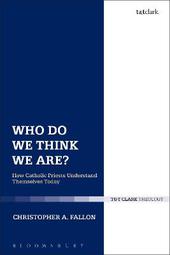
|
Who Do We Think We Are?: How Catholic Priests Understand Themselves Today
Hardback
Main Details
Description
This empirical study explores how the sampled priests understand their priesthood. Chris A. Fallon reviews Liverpool's history of expansion and decline, which has left fewer and older priests serving fewer active Catholics and an undiminished number who still require baptisms, first communions, marriages and funerals. It contrasts the models of priesthood found in Liverpool with American studies of the cultic and servant leader models of priesthood, taking into account the theological viewpoints and personality profiles of the individuals who took part.
Author Biography
Christopher A. Fallon studied Theology and Pastoral Ministry in Durham and Denver (USA) before serving as a Catholic Priest in the Archdiocese of Liverpool, UK.
ReviewsWith a balanced perspective, theological depth, and social science literacy, Christopher Fallon has written a work that will be helpful far beyond the Diocese of Liverpool, which is the focus of his study. This work is appreciative of the priesthood, and yet offers candid critiques of it. It is done out of commitment to ministry in the church, but recognizes the weaknesses of the church and its leadership. It takes a hard look at a struggling Catholicism and priesthood within it, and yet clearly has hopes for them both. Fallon offers a penetrating analysis of models of priesthood and understandings of the world, the church, and church authority, and proposes clear, concrete, and creative responses to the challenges and opportunities his analyses offer. Bishops in particular should read this work, but also priests, religious, and laity. * Stephen B. Bevans, Catholic Theological Union, USA * This work addresses a key problem in Roman Catholic practice today, namely the self understanding of those who are presbyters in Roman Catholic communities. Most attempts to address this problem derive from a systematic theology model of truth where doctrinal deduction from premises asserted as certain are then seen as offering solutions to practical and empirical matters in the historical order. This book makes a welcome change from this practice in that it is focused on a particular group and empirically seeks answers to its questions. I therefore see it not only contributing to an important discussion with Roman Catholicism today, but setting a model for how other investigations of these matters should be pursued. It will make a valuable contribution to the Ecclesiological Investigations series. * Thomas O'Loughlin, University of Nottingham, UK * Every library of any theological and pastoral institute involved in training for priestly and/or lay ministry will want to have this book on its shelves. The research has been so thorough and so well planned and implemented, it will become accepted reading in the field. The author has been able to survey a wide field of relevant literature and create appropriate research procedures in the light of that. There is also much in this thesis which will feed the hunger of priests on the ground, particularly the interviews with priests and the links between points made in these conversations and the conclusions drawn in the final section. This study raises important questions about the limitations of the polarity between the servant leader and cultic models of priesthood, about whether other models might be drawn out of these very intimate interviews with Liverpool priests and about the understanding of ordained priesthood within the whole ministry of the Church. Its conclusions will be of interest to clergy and laity within and beyond the Roman Catholic community. * Dr. Kevin T. Kelly, Liverpool Hope University, UK * The changes faced by the Roman Catholic community in England and Wales at the start of this century are of a scale and a complexity that defy simple analysis. Ready solutions - all too frequently built upon partisan preconceptions - cannot but fail to do justice to reality. It is, therefore, refreshing to come across a study that embraces the at times baffling contradictions that underpin attitudes on the ground and in doing so paints a rather more nuanced picture of Catholicism today. Chris Fallon's study adds to a growing body of literature that explores the attitudes and motivations of a key group within the Catholic community, its parish clergy. Fallon's close focus on the priests of the Liverpool archdiocese permits him to test out the findings of previous studies within a closely controlled subject group. His methodology is rigorous, and unites in a coherent investigative thrust both qualitative and quantitative approaches and an approach to personality testing. The detail of analysis is impressive, but so too is the nuanced nature of the findings: that polarities between different approaches to priesthood and attitudes towards the Church are far less pronounced among his subject group than other studies have claimed. The more complex our understanding of the Church and its ministers, the greater the challenge in building for the future. In contributing to that task, Fallon's tightly-argued text most certainly has a role to play. * Peter McGrail, Liverpool Hope University, UK *
|